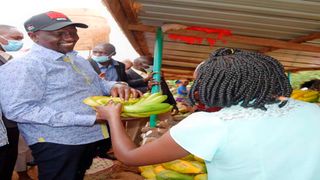
Deputy President William Ruto buys bananas at Ntharene market, Imenti South, Meru County on March 5, 2021.
| Charles Wanyoro | Nation Media GroupPolitics
Premium
‘Humble’ politicians serve tea, ride boda bodas
With just 10 months to the elections, politicians are suddenly letting out their humility.
If they are not eating bananas on top of their vehicles, then they are serving and drinking tea in some dingy iron-sheet kiosk or stopping at markets to buy fruits and groceries.
Photos of politicians depicting themselves in “acts of service and humility” are then widely shared online.
It is an old tactic that politicians have mastered, and they display it every election period. And the run-up to the 2022 General Election is no different.
In other seasons, they are seen in expensive outfits while being chauffeured in air-conditioned vehicles.
Earlier this week, Kirinyaga Governor Anne Waiguru’s social media pages were awash with photos of her serving tea to locals in Mwea.
“I enjoyed having a cup of tea with Mwea residents at Freshna Cafe and listening to their stories of how our Kirinyaga Rising vision has transformed their lives. Ground iko Imara! I am listening!” she posted.
Nearly three weeks ago, Deputy President William Ruto took his entourage to three counties in Mt Kenya: Kirinyaga, Murang’a and Nyeri.
He stopped at several markets. Dr Ruto, Murang’a Senator Irungu Kang’ata and other MPs bought bananas from roadside vendors and ate them while sitting on top of their top-of-the-range vehicles.
The photos went viral.
In March, photos of Kimilili MP Didmus Baraza hammering nails onto the roof of a classroom were posted online. A few hours after this stunt, he visited his Sango village in Bungoma and a photo was shared of him helping a 67-year-old woman prepare tea on an earthen stove.
“Reminiscent of hustlers life; at Sango Village matili where I visited a 67-year-old widow Mary Caroline Khaemba and assisted her to prepare tea on an earthen stove,” he posted on Facebook.
ODM leader Raila Odinga has also been “in touch” with the commoners recently. His recent trip to Central Kenya was punctuated by stops at markets along the roads, where he would emerge from a designated opening in the vehicle’s roof, smile widely, pause, and then wave at the hungry-looking Kenyans.
After his speech, he would have a look at a few items handed to him by business people who managed to reach his heavily guarded vehicle. At times, he would pick one of the items, then move to another centre and repeat the cycle.
While in Laikipia for three days, the former Prime Minister visited several small-scale businesses, and cameras clicked.
On September 26, pictures of Mr Odinga touching and feeling different fabrics and having direct conversations with locals surfaced. The next day, he made a few stops to buy fruits, and the photos followed too.
Former nominated Senator Isaac Mwaura also resurfaced a few days ago with a plethora of photos taken in Githurai, where he interacted with locals and was captured unloading murram from a lorry and buying vegetables from traders.
“As promised, we have this morning worked with Traders, Tuktuk and Bodaboda operators in Gïthurai market to help fix up poor roads in the area,” part of his Facebook post read.
And former Kakamega Senator Boniface Khalwale caused a stir two weeks ago when he tweeted that he rode on a boda boda to his house. “This evening I went home on boda boda..” he said.
This stunt came barely a month after photos of Mr Khalwale buying samosa from a roadside vendor went viral online.
Despite the “goodwill” by politicians, political analyst Herman Manyora has cautioned Kenyans about the upsurge of photos, saying they were strategies designed to hoodwink citizens into voting for the wrong leaders.
“They are just doing this for the votes. They cannot do this after the elections. They are trying to woo voters, and this practice is done globally. It is just optics, cheap optics,” he said.
The African belief that leadership is all about generosity and giving tokens is to blame, explained communication strategist and political analyst Mark Bichachi.
“This is not just about creating the perception that you are a people's person but also promoting handout politics. These are pure populist moves fronted by the Tangatanga,” he said.
“The problem with populist moves is that they force your opponents to copy your tactics to counter your influence.”
Mr Bichachi warns that if Kenyans continue accepting the cheap politics and handouts, they will have no one to blame but themselves if their leaders do not perform as expected.
“If I give you money to vote for me, then I bought that office. I will not listen to you and your needs. Kenyans tolerating these photo-ops and handouts are being successfully duped by politicians whose main aim is to kick objectivity out of elections,” he said.





